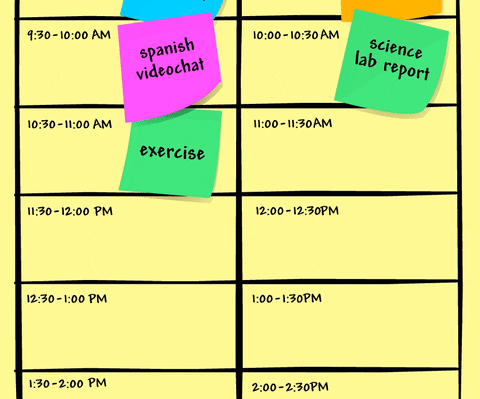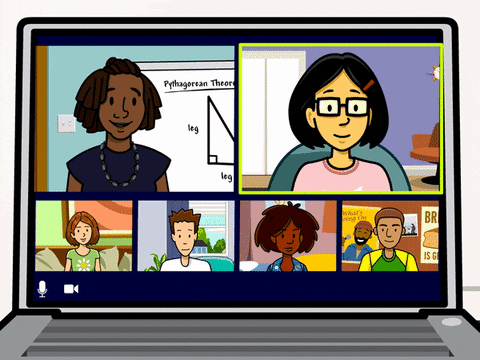My Experience as an Undergrad Adult Learner During the Pandemic
This post is written by Sandra (She/Her/Ella pronouns). She is a student staff member and a social work intern completing her field placement at the Women’s Center.
Content Note:This blog post will discuss my personal experience as an adult learner student before and during the current pandemic. The content and images shared may not encompass every adult learner’s student experience.
My experience as an adult learner within the higher education system has been full of challenges. The decision to come back to school to pursue my undergraduate degree was difficult, as I knew that this would mean having to juggle multiple roles and commitments. While attending classes for the past 7 years, I have been working full-time while also managing to maintain a 4.0 GPA as a full-time student.
I have also had to deal with the pressure and obligation of financially supporting myself and my parents. I come from a household that has depended on me since the time I was old enough to apply for a job. On top of the external stressors that have hindered me from graduating within the typical 4 year period, there were also the long hours spent during my weekly commutes from work to class and then back to work. As if it wasn’t bad enough having to deal with the stress from home or school, I also had to worry about getting to class and work on time. My days were split between having to work full-time, commuting for one hour each way to and from school, and trying to manage my workloads for school and work.
 [Image Description: A GYF with a calendar layout showing multiple meeting times. The graphics show a moving hand “posting” multi-color sticky notes with to-do assignments such as “exercise, lunch, science lab report, social students chapter, and Spanish video chat.”]
[Image Description: A GYF with a calendar layout showing multiple meeting times. The graphics show a moving hand “posting” multi-color sticky notes with to-do assignments such as “exercise, lunch, science lab report, social students chapter, and Spanish video chat.”]As I approached my senior year of undergrad, this had become life as I knew it until the COVID-19 pandemic made an abrupt shift throughout the world. It was then that I and every other student at UMBC were required to go from in-person learning to attending school via virtual platforms. This was truly a curveball for my last year as an undergrad as I had grown accustomed to my jam-packed schedule. However, the online environment and accessibility to resources alleviated many of the stressors I was enduring as a student. The ability to maintain a full-time job, be a full-time student and start an internship as a part-time student staff member was all made possible from the comfort of my own home.
Once the transition began, I had more time to work on homework and different professional goals which I hadn’t had the chance to start. The online environment also allowed me to be more involved in campus clubs and join many online community activities. I also had access to my professors, advisor, and other campus resources without having to worry about calling off from work or having to commute for over an hour to campus to meet them.
 [Image Description: A photo of a white and grey dog with red sunglasses and a colorful text that reads “READY FOR MY ZOOM CALL”]
[Image Description: A photo of a white and grey dog with red sunglasses and a colorful text that reads “READY FOR MY ZOOM CALL”]It is safe to say that this drastic change from in-person to virtual learning has made life so much easier for me. And as my final year of undergrad comes to an end, I can’t help but think about how much easier my life could have been if only this virtual learning opportunity would have been made available earlier on in my academic career. As an adult learner, I could have truly benefited from completing my program based on the virtual resources and opportunities that were made available this past year. I know I am not alone since more than 40% of adult learners make up for the nation’s college student body. There are roughly 17.3 million undergraduate students, and 31.2% of them identified students between the ages of 25 or older in the US. These are all students, who like me, have to juggle multiple roles and commitments outside of being a student. It should also be considered that the number of adult learners has been and continues to increase.
Adult Learners and Higher Education
Historically, higher education was design for the wealthy, particularly for white cis males. It was not made to accommodate the needs of women, parents, caregivers, immigrant students, students of color, LGBTQIA+ folx, people with disabilities, and people from low-income backgrounds (for a visual representation of these experiences, check out the trailer to Unlikely). In particular, higher education was not created to support the needs of adult learners who are usually parents, caregivers, or those who have to work full/part-time jobs to support themselves and their families. Institutions that do not consider the needs of adult learners and continue to sustain racial and oppressive practices directly affect adult learners who already have difficulties accessing education or complete a 4-year degree.
There are also evident achievement gaps in enrollment and retention for underrepresented student populations in higher ed institutions. Some of the most disproportionately affected groups are women who are adult learners. Most often, these women are parents who are trying to take care of their children while also managing their school/workloads. These are also women who are the sole providers of their families; often overworked and underpaid. Most women, especially women of color, who make up the adult learner population face higher dropout rates, higher rates in student debt, and experience higher levels of stress and anxiety. There is no doubt that women of color and people with marginalized identities are struggling to complete their degrees at higher ed institutions. The pandemic has emphasized the disproportion of resources allotted to adult learners, specifically working women who are seeking to better their home life and careers.
Back to “normal”?
As UMBC transitions back to more in-person classes, I would like to encourage the University to start having conversations centered around adult learners, and other students with different experiences who have benefited from the online environment. This is a conversation many other universities and colleges should be having too!
Although some classes have the option to meet online, most classes and programs at UMBC do not offer this option to students. Parents, caregivers, and students from low-income households would potentially benefit from taking more hybrid and online classes. This is because the traditional “rigid” academic schedule is very difficult for adult learners to balance. The convenience of flexible courses, compressed classes, fully online, or hybrid courses could ultimately help adult learners complete their degrees. In addition, adult learners wouldn’t have to worry about resigning from their jobs to attend school, as adult learners depend on their jobs to support themselves and their families. This would also reduce their transportation expenses as some students have to pay for gas or bus/train fares to travel to school for in-person learning.
 [Image Description: A GYF showing a computer screen with six animated people in an online class. One individual is talking and a tiger filter suddenly appears over her face. Everyone on the virtual call appears shocked.]
[Image Description: A GYF showing a computer screen with six animated people in an online class. One individual is talking and a tiger filter suddenly appears over her face. Everyone on the virtual call appears shocked.]It would also be helpful to continue to have virtual office hours, advising appointments, and online events/workshops for students. Belonging to a community that encourages, nurtures, and provides support to adult learners is critical to a student’s overall success. Plus, having the experiences of adult learners also benefits the learning and social experiences of traditionally aged students as well! For virtual learning to thrive and be as successful as it has been this past year, this will need to stay in place.
Overall, the adoption and continuation of the current virtual learning system could greatly benefit higher ed students, specifically many adult learners. Having been an adult learner who was required to meet in person for every class in my program, I can honestly say that I have personally benefited from virtual learning this past year. Truthfully, I believe that if it weren’t for the online classes this year, I would not be graduating this May. In all, my hope moving forward in my academic career is for virtual learning to be incorporated more as we continue to endure and one day overcome our current global health crisis.
Learn More About Other Adult Learners’ Story!
- Read about UMBC’s Returning Women Student Scholars News Article from last year graduating seniors!
- Returning Women’s Student Scholar spotlight, Christin Fagnani! Learn more about her experience as an adult learner on our Instagram and Facebook page.
- Returning Women’s Student Scholar spotlight, Joana Wall! Learn about her story: Instagram and Facebook
- Returning Women’s Student Scholar spotlight, Emma Earnest! Learn more about her experience as an adult learner on our Instagram and Facebook page!
- Returning Women’s Student Scholar spotlight, Christan Wallace. Learn about her story here: Instagram and Facebook posts.
- Returning Women’s Student Scholar spotlight, Lejla Heric-Safadi Instagram and Facebook.
- Returning Women’s Student Scholar Spotlight, Evangeline Kirigua. Learn more about her story here: Instagram and Facebook page!
Available Resources for Adult Learners at UMBC
- Returning Women’s Student Scholars + Affiliates Program: Returning Women Students Scholarship is to support undergraduate students age 25 and older in the completion of their first bachelor’s degree. In addition to the financial support offered through several different scholarships, the Returning Women Students Scholarships Program run by the Women’s Center provides a scholars community and various other support services and resources for scholarship recipients.
- Login to your MyUMBC account and click ‘FOLLOW’ on the following individual’s group pages to receive all the updates via email. It contains information about how to get connected to different campus resources and information about upcoming events.
- MyUMBC Women’s Center Group Page:
- MyUMBC Initiatives for Identity, Inclusion & Belonging (i3b) Group Page:
- MyUMBC First_Gen Group page
- Resources for Working Parents & Caregivers
- Office of Student Disability Services (SDS): For general questions: Email disability@umbc.edu or by phone at (410) 455-2459.
- Academic Advocates: are dedicated to serving undergraduates who are admitted as first-time, full-time, degree-seeking students to assist them in resolving academic and institutional challenges
- Academic Success Center
- The Office of Financial Aid and Scholarships
- Off-Campus Student Services
- The Albin O. Kuhn Library Resources
- Scholarship Retrieval Tool
- Counseling Center
References
- https://eab.com/insights/daily-briefing/adult-learner/4-things-adult-learners-need-to-balance-school-and-work/
- https://eab.com/insights/daily-briefing/adult-learner/adult-learners-who-they-are-what-they-want-from-college/
- https://online.maryville.edu/blog/going-back-to-school-statistics/
- https://www.insidehighered.com/advice/2020/10/16/many-people-deny-how-pervasive-racism-higher-ed-and-how-its-often-reproduced
- https://www.aacu.org/aacu-news/newsletter/2019/march/facts-figures
- https://ms-jd.org/blog/article/women-and-higher-education-a-brief-history
- https://fas.columbia.edu/files/fas/content/ASHE%20Higher%20Education%20Report.%20Nov2015%2C%20Vol.%2042%20Issue%201%2C%20p49-71.%2023p.%20.pdf
- https://www.aacu.org/publications-research/periodicals/higher-education-and-equity-historical-narratives-contemporary
- http://www.aacu.org/publications-research/periodicals/research-adult-learners-Supporting-needs-student-population-no
- https://www.investopedia.com/personal-finance/why-american-women-hold-23rd-student-debt/
- https://1gyhoq479ufd3yna29x7ubjn-wpengine.netdna-ssl.com/wp-content/uploads/Women_FR_Web.pdf
- https://www.washingtonpost.com/lifestyle/on-parenting/working-moms-covid-pandemic-jobs/2020/10/29/e76a5ee0-0ef5-11eb-8a35-237ef1eb2ef7_story.html
- https://educationdata.org/college-dropout-rates
- https://www.americanprogress.org/issues/education-postsecondary/reports/2018/05/23/451186/neglected-college-race-gap-racial-disparities-among-college-completers/
- Larsson, A., Hooper, N., Osborne, L. A., Bennett, P., & McHugh, L. (2016). Using brief cognitive restructuring and cognitive diffusion techniques to cope with negative thoughts. Behavior Modification, 40(3), 452–482. https://doi.org/10.1177/0145445515621488
- Ross-Gordon, J. M. (2011). Research on adult learners: Supporting the needs of a student population that is no longer nontraditional. Peer Review, 13(1), 26–29.
Posted: May 3, 2021, 1:54 PM